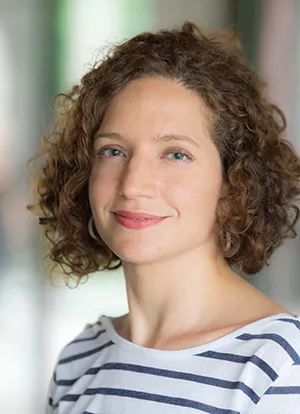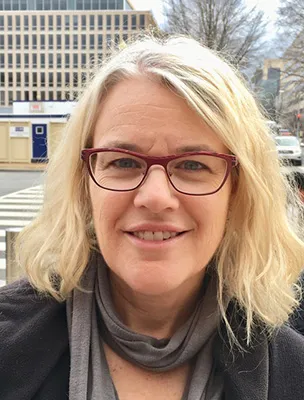New Global Studies Program to Explore How the World Works

“There’s great student interest in global issues, but up to this point, we did not have a program that systematically and coherently brought various courses together and in conversation with each other,” says Ayse Kaya, associate professor of political science.
This fall, Swarthmore faculty voted to introduce a new interdisciplinary program in global studies, co-founded by Ayse Kaya, associate professor of political science, and Carina Yervasi, associate professor of French and Francophone studies.
The program will focus on understanding and analyzing global processes, systems, and phenomena. It also aims to study the relationships between the local and the global, and the trans-border connections among people and events. It will bring together courses across the humanities, social sciences, and the natural sciences and engineering curriculum, and will offer a minor in the discipline.
“We want to provide an academic ‘home’ in response to students’ varied and interdisciplinary interests on global issues and give guidance to each student’s ‘pathway’ of courses,” Yervasi says. The program will also help build cross-cultural competence, and a consciousness around bridging differences without prejudice through understanding of similarities, she says. A strong language-learning component in the program will help serve this goal.
The process of drafting the proposal and getting it to its final stage—including feedback and widespread support from colleagues—was inclusive and collaborative, say Kaya and Yervasi. “We were overwhelmed by the generosity of colleagues who spent a considerable amount of time on the proposal and provided support as well as constructive criticism that pushed us to think harder at each stage,” says Kaya.
“This program—from idea to a few paragraphs through many conversations to the final proposal brought to faculty vote—exists because of constructive feedback, comments, and suggestions made in the spirit of cooperation, and for this we are truly grateful,” says Yervasi.
The global studies program “strengthens our already ongoing efforts in the area of both recruiting and retaining a diverse faculty and student body,” says Lynne Steuerle Schofield ’99, associate provost for faculty diversity and development and associate professor of statistics. “As we have worked to increase the diversity of our campus, it is necessary for us to provide a place for our students and our faculty to engage in discussions which critically reflect on how the world works as an interlinked, interactive set of processes and relationships that operate across broad spheres of experience.”
Associate Professor of Political Science Dominic Tierney echoes that Swarthmore students have an increasingly international outlook in their studies, travel, internships, and career plans. A global studies program is important, he says, because it will both reflect student interest and inspire new avenues of scholarship and work. “At a time when the world order has come under severe challenge,” says Tierney, “we need a generation of students that are trained in the diverse approaches of global studies.”

“We want to provide an academic ‘home’ in response to students’ varied and interdisciplinary interests on global issues,” Yervasi says.
Associate Professor of English Literature Bakirathi Mani says she admires the program’s long view on globalization. “Our current campaign has a mission of ‘Changing Lives, Changing the World,’” Mani says. “Surely, a global studies program is central to the work of ‘changing the world’ by emphasizing how richly networked our lives are in the world today.”
Kaya and Yervasi believe the timing of the program is critical because global studies is a recognized field, and many of Swarthmore’s peer institutions already have similar programs. “There’s great student interest in global issues, but up to this point, we did not have a program that systematically and coherently brought various courses together and in conversation with each other,” Kaya says. “While we were not thinking of the political environment in creating the course, in retrospect, another benefit of the program can be to re-orient students to look outward and outside, think comparatively, and study the U.S. as not necessarily or always exceptional.”
The two co-founders, who will also co-direct the program, are uniquely suited to their roles in leading the program. Kaya’s research and teaching center on the processes of globalization, particularly economic globalization, and its governance. “I’m excited to design and teach the Introduction to Global Studies course that will be mandatory for the minor,” she says. “My service on the Council on Educational Policy for two years has also pushed me to think hard about Swarthmore’s curriculum.”
Yervasi’s research on interdisciplinary approaches to film and Francophone studies in both modern European and West African postcolonial contexts will inform her leadership of the program. “As faculty adviser to Off-Campus Study for a few years, I saw how returning students navigated existing courses with their new global perspectives and felt that a curricular change specifically geared toward the global would serve all students well,” she says.
Notably, they both felt it was important to include courses from the sciences in the global studies program because it benefits the students who may not naturally think of the connection of the sciences within a social, political, and legal context. “And, hopefully, it benefits our students who are not naturally inclined to take science courses,” says Kaya. “To say scientific knowledge, which in itself tends to be global, is necessary to understanding the world is an understatement. In terms of the College, it was important to have the three divisions participate in the program—one of the benefits of a liberal arts education should be the non-siloed ways in which disciplines and divisions interact.”
Kaya and Yervasi say that students should be able to see a list of courses in spring 2019 and that they look forward to involving alumni in the near future.
Swarthmore is investing in its vibrant intellectual culture. Learn how at lifechanging.swarthmore.edu.



